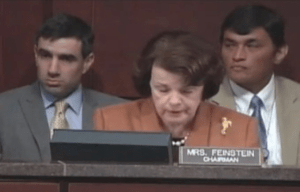
The Drone Federalism Act would give states sweeping rights to dramatically limit drone use. The Act seeks to define the FAA’s preemption as limited to only “the extent necessary to ensure the safety and efficiency of the national airspace system for interstate commerce.” The Act also seeks to:
…preserve, to the greatest extent practicable, legitimate interests of State, local, and tribal governments, including—
(A) protecting public safety;
(B) protecting personal privacy;
(C) protecting property rights;
(D) managing land use; and
(E) restricting nuisances and noise pollution.
Feinstein’s proposal would reserve state authority to “issue reasonable restrictions on the time, manner, and place of operation of a civil unmanned aircraft system that is operated below 200 feet above ground level or within 200 feet of a structure,” and further defines “reasonable restrictions” to include: limits on speed; prohibitions on flight near any public or private property; restrictions on operations during certain times of day or week, or special occasions; and other “prohibitions that protect public safety, personal privacy, or property rights, or that manage land use or restrict noise pollution.”
The proposal also takes on the issue of airspace over private property, something currently in question and as yet unclear. While the FAA claims authority to regulate airspace from the ground up, the Drone Federalism Act says that drones could not fly over private property without permission of the property owner. The Act defines the airspace over private property as within 200 feet of the ground or a structure, but allows for even further restrictions by expanding the definition to include “any area where operation of the aircraft system could interfere with the enjoyment or use of the property.”
The proposed regulations could have serious negative consequences for the drone industry, requiring operators to comply with 50 separate sets of regulations and preventing many commercial and life-saving applications that might require flight over private property. The proposal is in direct opposition to the FAA’s efforts to limit states’ abilities to regulate drones. In a statement last year, FAA Administrator Michael Huerta said that the proliferation of state and local drone laws would create a “patchwork quilt” of drone regulations that would put undue burden on operators and limit the growth of the industry.
Vic Moss, a professional drone pilot and an active administrator on the UAV Legal News and Discussion Facebook Group, says that the bill could have an extreme negative effect on commercial operators. “In states like California, it has the very real potential to shut down the drone industry,” says Moss. “If California were to prohibit drones anywhere closer that 200’ from private structures without permission, there is no way for a drone operator or pilot to fly in the suburbs – and that’s where the majority of real estate and inspection work is. It’s also where the majority of hobby flights take place.”
“I’ve flown over 55 roof inspections in the last 10 days due to the recent Denver hail storm. If Feinstein’s bill had been in affect, and Colorado had fallen into the 200’ trap, myself and about 30 other pilots would have been out tens of thousands of dollars,” Moss points out. “And who knows how many insurance adjusters would have fallen off of roofs or ladders in that time? …In addition to putting thousands of drone companies out of business, it will set back this industry and it’s growth potential to levels worse than they were at the very beginning.”
The National Council of State Legislators, who maintain a list of current state drone laws, applauded Feinstein’s proposal. “On behalf of the nation’s governors, legislators and chief state aviation officials, we commend you for introducing the Drone Federalism Act, which would affirm state regulatory authority regarding the operation of unmanned aerial systems (UAS), or drones,” said the NCSL statement of support. “…As written, the Drone Federalism Act of 2017 would both protect the FAA’s authority to ensure safety of the airspace, while also maintaining state and local authority to protect public safety and security, personal privacy, property rights and manage land use regarding the operation of drones.”
Miriam McNabb is the Editor-in-Chief of DRONELIFE and CEO of JobForDrones, a professional drone services marketplace, and a fascinated observer of the emerging drone industry and the regulatory environment for drones. Miriam has penned over 3,000 articles focused on the commercial drone space and is an international speaker and recognized figure in the industry. Miriam has a degree from the University of Chicago and over 20 years of experience in high tech sales and marketing for new technologies.
For drone industry consulting or writing, Email Miriam.
TWITTER:@spaldingbarker
Subscribe to DroneLife here.